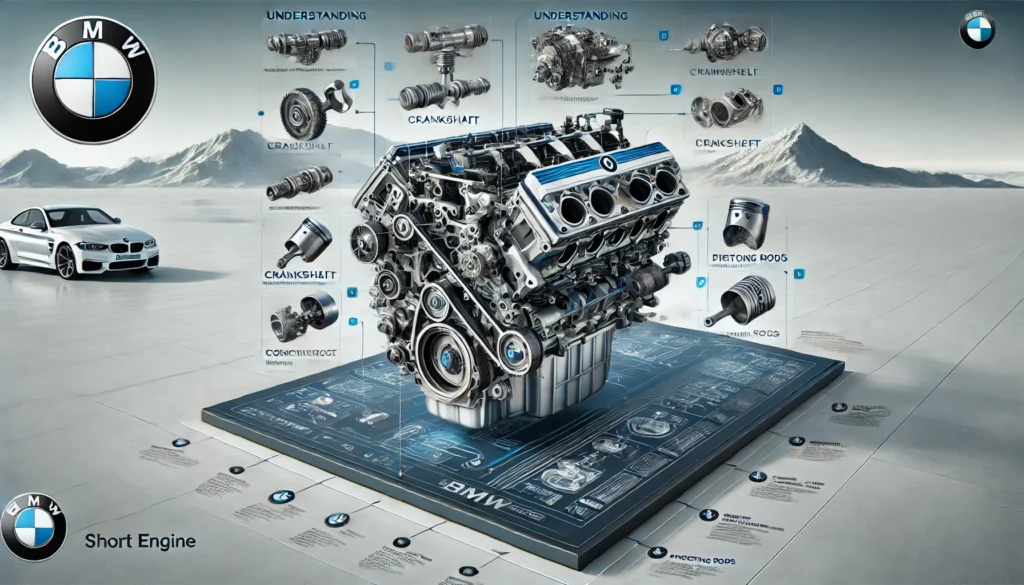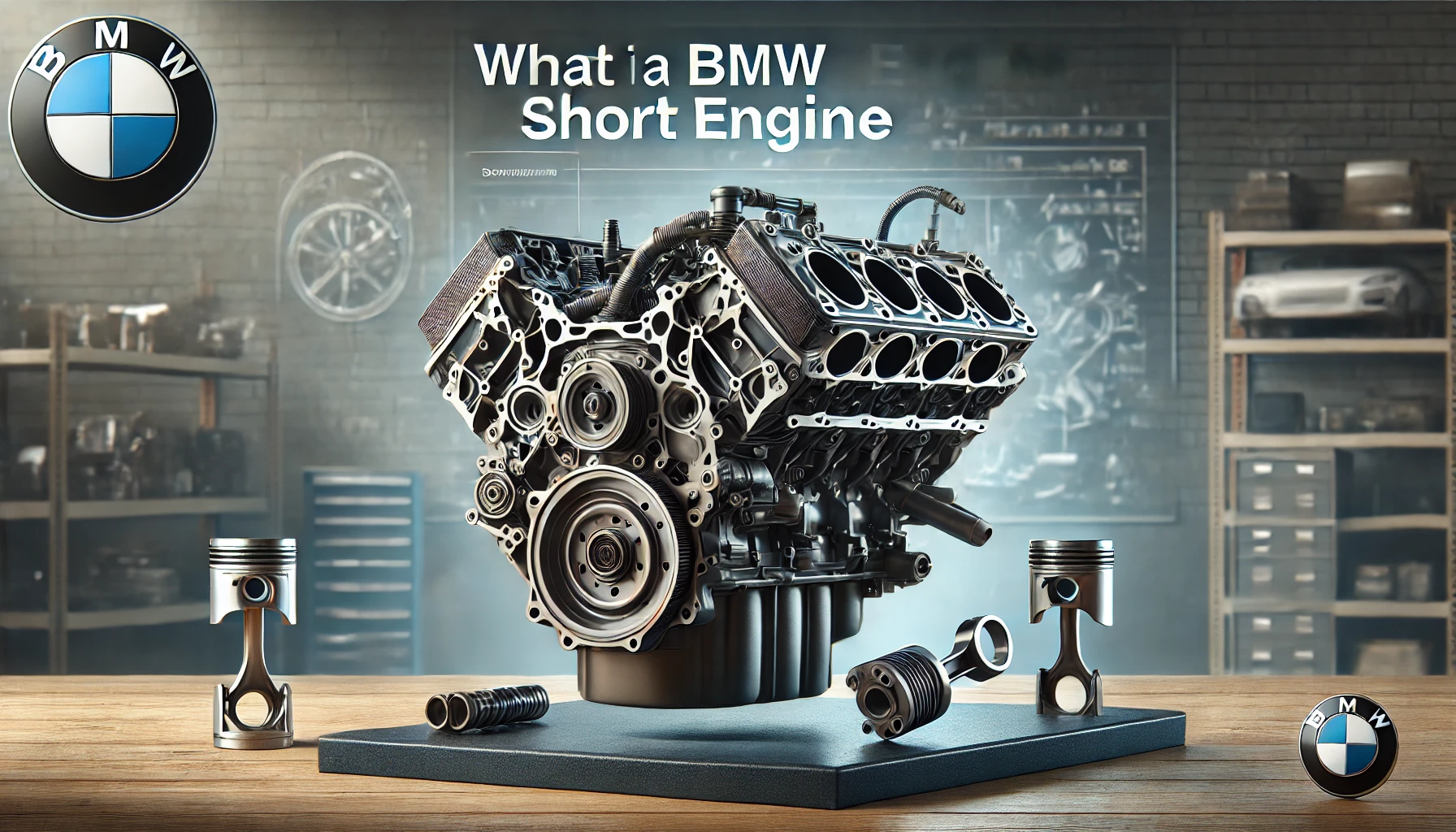If you’re a BMW owner or an enthusiast, you might have come across the term “BMW short engine” and wondered what it means. Well, let me break it down for you in a way that’s easy to understand. Whether you’re dealing with engine issues or simply curious about BMW’s engineering, knowing about a short engine can be useful.
Understanding a BMW Short Engine

A short engine, sometimes called a short block, refers to a partially assembled engine that includes essential components like the cylinder block, crankshaft, pistons, and connecting rods. Unlike a complete engine, a short engine does not include the cylinder head, timing components, or other accessories.
Why Would You Need a BMW Short Engine?
There are several reasons why someone might consider replacing or rebuilding a BMW short engine:
- Engine Damage – If your BMW has suffered a major engine failure due to overheating, oil starvation, or internal damage, replacing the short engine is a cost-effective solution.
- Wear and Tear – Over time, high-mileage engines experience wear on critical components like piston rings and crankshafts. Instead of rebuilding the entire engine, swapping in a short engine can restore performance.
- Performance Upgrades – Some BMW enthusiasts opt for short engines when they want to rebuild or upgrade their engine for better performance, especially in M models or high-performance builds.
What’s Included in a BMW Short Engine?
A BMW short engine typically includes:
- Engine Block – The foundation of the engine where all components are housed.
- Crankshaft – Converts linear motion from the pistons into rotational power.
- Pistons & Connecting Rods – Essential for power generation within the combustion chamber.
- Main Bearings & Seals – Ensure smooth movement of internal parts and prevent oil leaks.
However, it does NOT include:
- Cylinder head
- Camshafts
- Timing chain or timing belt
- Fuel injectors and ignition system
- Turbocharger (if applicable)
This means that if you’re installing a new short engine, you’ll need to transfer or purchase these additional parts separately.
Short Engine vs. Long Engine – What’s the Difference?
BMW also offers what’s called a long engine, which includes the short engine components plus the cylinder head, camshafts, and sometimes timing components. While a long engine is closer to a complete engine replacement, a short engine is often preferred for cost savings and custom builds.
Also Read: What Does Short Engine Mean – A Comprehensive Overview!
Benefits of Using a BMW Short Engine
- Cost-Effective Replacement – Instead of purchasing a complete engine, a short engine can save you money, especially if your existing cylinder head and other components are in good shape.
- Faster Repair Process – Since most of the complex internals are pre-assembled, a short engine swap is quicker than rebuilding an engine from scratch.
- OEM Quality & Reliability – If you get a genuine BMW short engine, you’re guaranteed a high-quality product that meets factory specifications.
- Custom Build Flexibility – Many performance enthusiasts prefer short engines because they can choose their own cylinder heads, camshafts, and tuning options.
Where to Buy a BMW Short Engine?
If you’re in the market for a short engine, you have a few options:
- Authorized BMW Dealerships – The safest option if you want a brand-new, factory-certified engine.
- Aftermarket Suppliers – Some companies specialize in remanufactured or upgraded short engines for BMWs.
- Used Parts Dealers – You can find second-hand short engines, but always check mileage and condition before buying.
Things to Consider Before Buying a BMW Short Engine
Before making a purchase, consider these important factors:
- Compatibility – Make sure the short engine is compatible with your specific BMW model and year.
- Condition – If buying used, check for signs of excessive wear, damage, or poor maintenance history.
- Warranty – A new or remanufactured engine should come with a warranty to protect your investment.
- Installation Costs – Swapping a short engine requires expertise, so consider labor costs if you’re not doing it yourself.
FAQ’s
1. What is a BMW short engine?
A BMW short engine is a partially assembled engine that includes the engine block, crankshaft, pistons, and connecting rods. It does not include the cylinder head, camshafts, or other accessories.
2. Why would I need a BMW short engine?
You might need a short engine if your current engine is damaged, worn out, or if you want to upgrade your BMW’s performance without buying a full engine.
3. What parts are included in a short engine?
A BMW short engine includes the engine block, crankshaft, pistons, connecting rods, and main bearings. Other parts like the cylinder head and timing components are not included.
4. What is the difference between a short engine and a long engine?
A short engine includes only the lower part of the engine (block, crankshaft, pistons), while a long engine includes everything in a short engine plus the cylinder head and camshafts.
5. Can I replace a BMW short engine myself?
Replacing a short engine is a complex job that requires special tools and experience. It is best done by a professional mechanic.
6. How much does a BMW short engine cost?
The cost varies depending on the model and whether it’s new, used, or remanufactured. Prices typically range from $3,000 to $10,000, plus installation costs.
7. Where can I buy a BMW short engine?
You can buy a BMW short engine from authorized BMW dealerships, aftermarket suppliers, or used parts dealers. Always check compatibility and warranty before purchasing.
8. How long does a short engine last?
If properly maintained, a BMW short engine can last over 100,000 miles. Regular oil changes and proper care will help extend its lifespan.
Conclusion
A BMW short engine is a smart choice if you’re dealing with engine failure or planning an upgrade. It provides a balance between cost and reliability, allowing you to rebuild your BMW without replacing unnecessary components. Whether you go for a brand-new OEM short engine or a high-performance aftermarket option, make sure you choose wisely based on your needs and budget. If you’re considering a short engine replacement for your BMW, it’s always best to consult a professional mechanic to ensure a smooth installation. Have you ever replaced a BMW engine before? Share your experience in the comments!




